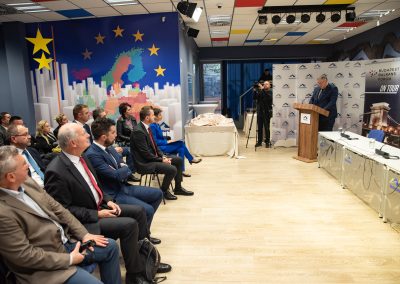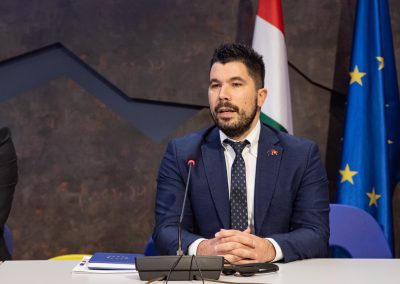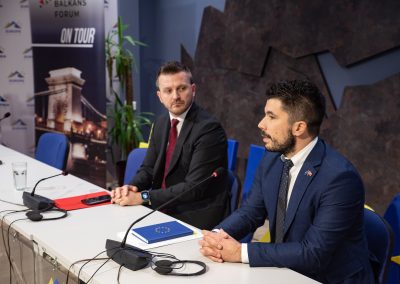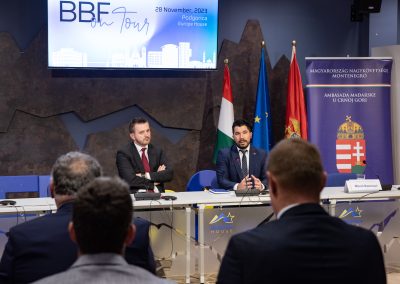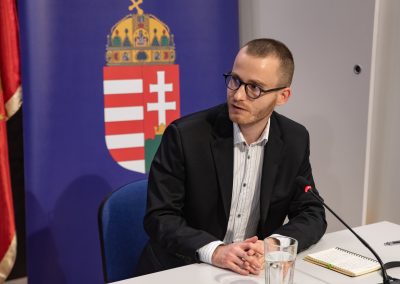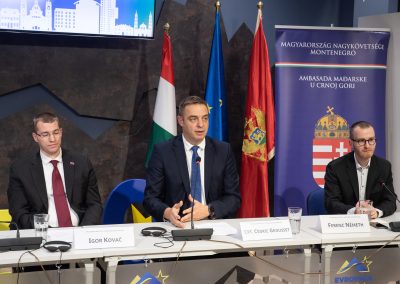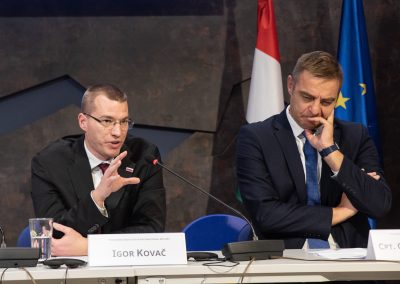The third stop of the BBF on Tour programme series of the Hungarian Institute of International Affairs (HIIA) took place in Montenegro on 28 November, 2023. The event, co-organized with the Embassy of Hungary in Podgorica, dealt with issues related to cybersecurity and cybercrime, and touched on the importance of the Western Balkans’ digital future.
Describing the BBF on Tour series, Ambassador István Íjgyártó, Chief Advisor and Senior Research Fellow of HIIA highlighted the importance of bringing our flagship conference, Budapest Balkans Forum to the capitals of the Western Balkans, and described it as a “natural evolution” of our regional activities. In her welcoming remarks, Míra Vuity, Deputy Head of the Embassy of Hungary in Podgorica, noted that the rapidly growing digital space creates new, borderless challenges; thus, improving cyber resilience is important for all countries in the region. Hungary is not only a promoter of Montenegro’s EU integration but also ready to transfer its knowledge concerning cybersecurity.
The welcome addresses were followed by keynote speeches from government representatives. Marash Dukaj, Minister of Public Administration of Montenegro pointed out that digital administration must be based on a secure infrastructure that benefits all citizens. He also elaborated on the government’s recent acts in establishing authorities, in accordance with standards of the European Union, to combat cyberattacks more efficiently. Since cybercrime does not know borders, regional and international cooperation is important: the establishment of the Western Balkans Cyber Capacity Centre (WB3C) with France and Slovenia in the framework of the Berlin process is a testament to the commitment of sharing good practices from EU member states.
Miloš Radonjić, Head of the Working Group for Chapter 24 at the Ministry of European Affairs of Montenegro noted that this event can be of great contribution to the upcoming EU Presidency of Hungary. Mr. Radonjić noted that the fight against cybercrime and cyberattacks are part of Chapter 24, more notably Cluster 1 (Fundamentals), thus making these topics essential parts of EU integration process. According to the latest country report by the European Commission, Montenegro has further developed its capacities to combat cybercrime by, for example, strengthening relevant units of the police enforcement. Furthermore, Mr. Radonjić pointed out that cybersecurity has a tremendous impact on business and economic development too: it is a multidimensional, cross-cutting issue that impacts the entire accession process of Montenegro. Therefore, further steps must be taken to strengthen regional cooperation mechanisms within NATO structures too.
Following the keynote speeches, the event continued with a panel discussion about the current situation of cybersecurity in Montenegro (and in the Western Balkans). The expert-level discussion featured Captain Cédric Grousset, Project Manager and Director of Studies of the WB3C; Igor Kovač, Government Information Security Officer at the Government of Slovenia; Dušan Krkotić, Director of the Directorate for Information Security at the Ministry of Public Administration of Montenegro; and Gábor Nyáry, Researcher at the Institute of Cybersecurity of the National University of Public Service (NUPS). The discussion was moderated by Ferenc Németh, Program Manager and Research Fellow of HIIA.
Cédric Grousset presented the WB3C’s training plans, including its basic functions and purposes, and highlighted that it aims to offer the possibility for all the countries of the region for cyber security capacity building. Captain Grousset said that trust is important and the basis of everything in cyberspace. In this light, universities and research centres must be strengthened. He pointed to the added value of public-private cooperation and the involvement of SMEs as well asthe importance of institutional cooperation, and therefore the identification of means and ways of cooperation is key.
Igor Kovač welcomed the plans outlined by Captain Grousset. According to Mr. Kovač, cyberspace is the nerve system of the state; however, the logic is different between real space and cyberspace and requires a different mindset. Due to the fact that cyberspace is interconnected, if something happens in Slovenia, it has an impact at the regional level. Mr Kovač underlined the importance of the EU and NATO cybersecurity tools and institutional frameworks, both within NATO and EU, and the sharing of best practices in the face of growing cybersecurity threats. Mr Kovač said that China, Russia, North Korea and Iran are the four main troublemakers in cyberspace in the Western Balkans. In the fight against cybercrime, it is important to raise awareness and disrupt the business model linked to cybercrime.
Arguing in favour of capacity building, Dušan Krkotić stressed that last year’s cyber-attack severely affected the IT foundations and tools of the public administration in Montenegro, which was a serious warning and caused lasting damage. For this reason, Podgorica has great expectations and did a lot to strengthen capacities, including a new set of laws on protecting national critical infrastructure. The biggest challenge, however, is overcoming the lack of expertise. Technical assistance from various sources (including the US and EU) proved essential to deal with the consequences of such attacks. These forms of assistance will continue to be needed in the future, along with an urgent and substantial reinforcement of the Montenegrin expert base.
Gábor Nyáry argue that there is a “rapid worsening of the cyber security situation” globally, mainly caused by the rapid digitalisation of societies and technological development. Mr Nyáry drew attention to the need for continuous improvement, adaptation and awareness-raising due to the changing and increasingly intense cyber threats. Analysing and improving national and international cyber defence practices and ensuring the conditions and the most effective level of cyber security requires not only continuous learning and training, but also close cooperation and concerted action between both public and private actors. Mr Nyáry pointed out as a good practice that Hungary launched its own initiative last November called Cyber Shield which brings together government and civil society.
At the end of the panel discussion, speakers identified four main tools that are important to achieve cybersecurity and combat cyber threats: 1) education; 2) cooperation with governmental and non-governmental actors/institutions at national, regional and international level; 3) disruption of the business model; and 4) raising public awareness.
For more details about the next stops of the BBF on Tour event series, visit the official website of the Budapest Balkans Forum.
For more information about the Budapest Balkans Forum, follow us on social media.


